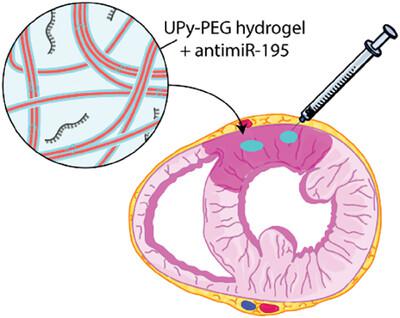当前位置:
X-MOL 学术
›
Adv. Therap.
›
论文详情
Our official English website, www.x-mol.net, welcomes your feedback! (Note: you will need to create a separate account there.)
Hydrogel-Based Delivery of antimiR-195 Improves Cardiac Efficacy after Ischemic Injury
Advanced Therapeutics ( IF 4.6 ) Pub Date : 2023-12-04 , DOI: 10.1002/adtp.202300241 Joep E.C. Eding 1 , Marta Vigil‐Garcia 1 , Marit Vink 1 , Charlotte J. Demkes 2 , Danielle Versteeg 2 , Lieneke Kooijman 1 , Maarten H. Bakker 3 , Maaike J.G. Schotman 3 , Patricia Y.W. Dankers 3 , Eva van Rooij 2
Advanced Therapeutics ( IF 4.6 ) Pub Date : 2023-12-04 , DOI: 10.1002/adtp.202300241 Joep E.C. Eding 1 , Marta Vigil‐Garcia 1 , Marit Vink 1 , Charlotte J. Demkes 2 , Danielle Versteeg 2 , Lieneke Kooijman 1 , Maarten H. Bakker 3 , Maaike J.G. Schotman 3 , Patricia Y.W. Dankers 3 , Eva van Rooij 2
Affiliation

|
MicroRNAs (miRs) are potent regulators of biology and disease. The miR-15 family is shown to regulate cardiomyocyte proliferation and antimiR-based inhibition induces a cardioprotective effect after myocardial infarction in mice. However, systemic delivery of antimiRs leads to accumulation in kidneys and liver, with relatively poor cardiac exposure. Injectable hydrogels are proposed to serve as sustained-release drug delivery depots and can potentially be used to improve cardiac efficacy of antimiR therapeutics. Here, the effect of a hydrogel-formulated antimiR-195 after myocardial infarction in mice is studied. For this, an injectable, pH-switchable supramolecular hydrogel based on poly(ethylene glycol) (PEG) functionalized with hydrogen bonding ureido-pyrimidinone (UPy) units is used. Intracardiac injections under baseline conditions of this UPy–PEG hydrogelator induce a transient inflammatory response that is no longer present 7 days postinjection. In vitro experiments show that antimiR-195 is released from the gel, and induces microRNA inhibition leading to downstream cardiomyocyte proliferation. In vivo, intramyocardial delivery of antimiR-195 in UPy–PEG enhances cardiac target derepression compared to phosphate-buffered-saline-dissolved antimiR-195, despite a low cardiac retention. After ischemic injury, this translates into a greater therapeutic effect by increasing both target derepression and cardiomyocyte proliferation. Intramyocardial injection of UPy–PEG-formulated antimiR-195 is sufficient to improve cardiac efficacy of antimiR-195.
中文翻译:

基于水凝胶的 antimiR-195 递送可改善缺血性损伤后的心脏功效
MicroRNA (miR) 是生物学和疾病的有效调节因子。miR-15 家族被证明可以调节心肌细胞增殖,并且基于抗 miR 的抑制可在小鼠心肌梗塞后诱导心脏保护作用。然而,抗miRs的全身递送会导致肾脏和肝脏中的积累,而心脏暴露相对较差。注射水凝胶被提议用作缓释药物递送库,并有可能用于提高抗miR疗法的心脏功效。在此,研究了水凝胶配制的抗miR-195在小鼠心肌梗塞后的作用。为此,使用了一种可注射、pH 可切换的超分子水凝胶,该水凝胶基于用氢键脲基嘧啶酮 (UPy) 单元功能化的聚乙二醇 (PEG)。在这种 UPy-PEG 水凝胶剂的基线条件下进行心内注射会引起短暂的炎症反应,该反应在注射后 7 天不再存在。体外实验表明 antimiR-195 从凝胶中释放,并诱导 microRNA 抑制,导致下游心肌细胞增殖。在体内,与磷酸盐缓冲盐水溶解的 antimiR-195 相比,心肌内递送 UPy-PEG 中的 antimiR-195 增强了心脏靶点的去抑制,尽管心脏滞留较低。缺血性损伤后,通过增加靶点去抑制和心肌细胞增殖,这转化为更大的治疗效果。心肌内注射 UPy-PEG 配制的 antimiR-195 足以提高 antimiR-195 的心脏功效。
更新日期:2023-12-04
中文翻译:

基于水凝胶的 antimiR-195 递送可改善缺血性损伤后的心脏功效
MicroRNA (miR) 是生物学和疾病的有效调节因子。miR-15 家族被证明可以调节心肌细胞增殖,并且基于抗 miR 的抑制可在小鼠心肌梗塞后诱导心脏保护作用。然而,抗miRs的全身递送会导致肾脏和肝脏中的积累,而心脏暴露相对较差。注射水凝胶被提议用作缓释药物递送库,并有可能用于提高抗miR疗法的心脏功效。在此,研究了水凝胶配制的抗miR-195在小鼠心肌梗塞后的作用。为此,使用了一种可注射、pH 可切换的超分子水凝胶,该水凝胶基于用氢键脲基嘧啶酮 (UPy) 单元功能化的聚乙二醇 (PEG)。在这种 UPy-PEG 水凝胶剂的基线条件下进行心内注射会引起短暂的炎症反应,该反应在注射后 7 天不再存在。体外实验表明 antimiR-195 从凝胶中释放,并诱导 microRNA 抑制,导致下游心肌细胞增殖。在体内,与磷酸盐缓冲盐水溶解的 antimiR-195 相比,心肌内递送 UPy-PEG 中的 antimiR-195 增强了心脏靶点的去抑制,尽管心脏滞留较低。缺血性损伤后,通过增加靶点去抑制和心肌细胞增殖,这转化为更大的治疗效果。心肌内注射 UPy-PEG 配制的 antimiR-195 足以提高 antimiR-195 的心脏功效。



























 京公网安备 11010802027423号
京公网安备 11010802027423号